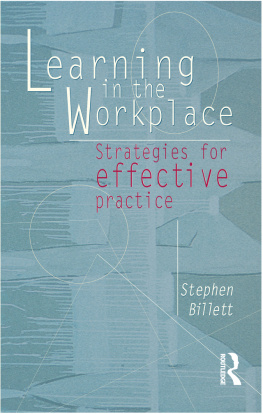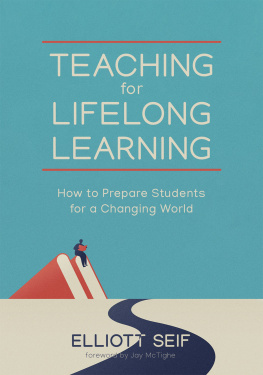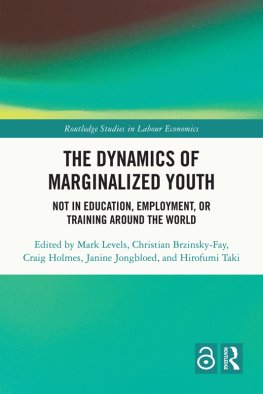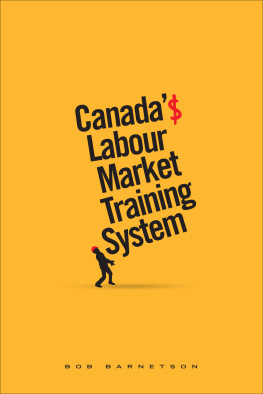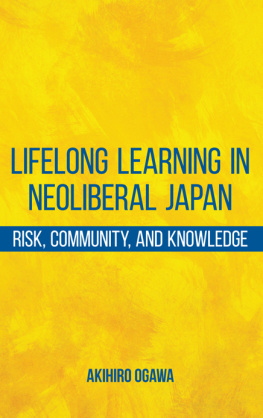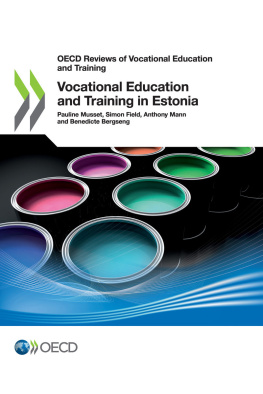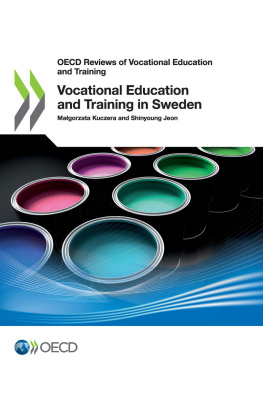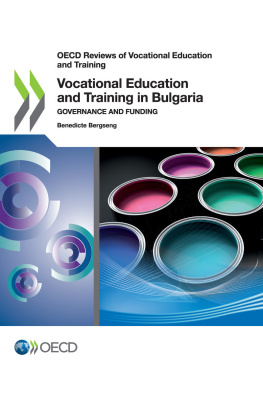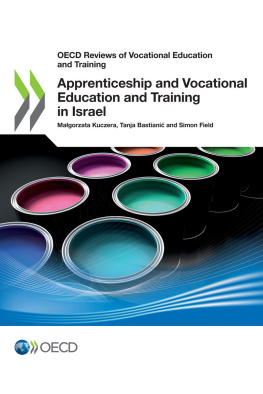VOCATIONAL STUDIES, LIFELONG LEARNING AND SOCIAL VALUES
For Pat, Paul and Sue, who are all members of the lifelong learning community whether they know it or not
Monitoring Change in Education
Series Editor: Cedric Cullingford
Also in the series:
Lifelong and Continuing Education
Edited by Paul Oliver
ISBN 1 84014 905 1
Beyond the Universities: The New Higher Education
Edited by Philip Mitchell
ISBN 1 85742 394 1
Science Education in the 21st Century
Edited by David Thompson
ISBN 1 85742 382 8
The Management of Educational Change
Edited by Paul Oliver
ISBN 1 85742 379 8
Parents, Education and the State
Edited by Cedric Cullingford
ISBN 1 85742 338 0
Vocational Studies, Lifelong Learning and Social Values
Investigating education, training and NVQs under the New Deal
Terry Hyland
Lecturer in Continuing Education at the University of Warwick
First published 1999 by Ashgate Publishing
Reissued 2018 by Routledge
2 Park Square, Milton Park, Abingdon, Oxon OX14 4RN
52 Vanderbilt Avenue, New York, NY 10017
Routledge is an imprint of the Taylor & Francis Group, an informa business
Copyright Terry Hyland 1999
All rights reserved. No part of this book may be reprinted or reproduced or utilised in any form or by any electronic, mechanical, or other means, now known or hereafter invented, including photocopying and recording, or in any information storage or retrieval system, without permission in writing from the publishers.
Notice:
Product or corporate names may be trademarks or registered trademarks, and are used only for identification and explanation without intent to infringe.
Publisher's Note
The publisher has gone to great lengths to ensure the quality of this reprint but points out that some imperfections in the original copies may be apparent.
Disclaimer
The publisher has made every effort to trace copyright holders and welcomes correspondence from those they have been unable to contact.
A Library of Congress record exists under LC control number: 9972977
ISBN 13: 978-1-138-36082-2 (hbk)
ISBN 13: 978-0-429-43243-9 (ebk)
- ALBSU Adult Literacy and Basic Skills Unit
- BCC British Chambers of Commerce
- BTEC Business and Technology Educational Council
- CAL Computer-Assisted Learning
- CBET Competence-Based Education and Training
- CBI Confederation of British Industry
- C&G City and Guilds
- CPVE Certificate of Pre-Vocational Education
- DES Department of Education and Science
- DfEE Department of Education and Employment
- DTI Department of Trade and Industry
- EDAP Employment Development and Assistance Programme
- FE Further Education
- FEDA Further Education Development Agency
- FEFC Further Education Funding Council
- FEU Further Education Unit
- GNVQ General National Vocational Qualification
- HCT Human Capital Theory
- HE Higher Education
- HEC Higher Education for Capability
- HMI Her Majesty's Inspectorate
- HRD Human Resource Development
- HRM Human Resource Management
- ICT Information and Communications Technology
- IiP Investors in People
- MA Modern Apprenticeship
- MSC Manpower Services Commission
- NACETT National Advisory Council for Education and Training Targets
- NCC National Curriculum Council
- NCVQ National Council for Vocational Qualifications
- NIACE National Institute of Adult Continuing Education
- NTETs National Training and Education Targets
- NTOs National Training Organisations
- NVQ National Vocational Qualification
- OFSTED Office for Standards in Education
- PCET Post-Compulsoiy Education and Training
- QCA Qualifications and Curriculum Authority
- RSA Royal Society of Arts
- SMEs Small and Medium-Sized Enterprises
- SVQ Scottish Vocational Qualification
- TEC Training and Enterprise Council
- TVEI Technical and Vocational Education Initiative
- UfI University for Industry
- VET Vocational Education and Training
- WTW Welfare to Work
- YTS Youth Training Scheme
Introduction
Lifelong learning is the slogan chosen by the Labour government to summarise, publicise and popularise its values and policies for education and training under the new administration. The government's National Advisory Group was appointed specifically to address issues of lifelong learning (Fryer, 1997), the concept features prominently in the Kennedy report on further education (Kennedy, 1997) and the Dearing report on higher education (Dearing, 1997), and lifelong learning assumptions dominate and dictate all the key policies in the government Green Paper The Learning Age (DfEE, 1998a). The concept of lifelong learning is, however, by no means a new one. Like its predecessor, the 'learning society', it has been appropriated from the adult education tradition (Hyland, 1994a; Edwards, 1997; Duke, 1992; Barnett, 1998) in order to prescribe a conception of learning, from the 'cradle to the grave' or, as Henry Morris put it, with the aim of 'raising the school leaving age to 90' (Kellner, 1998, p. 15), to replace the mainstream and dominant school-centred, so-called 'front-loading' model of education. It might be worth examining these earlier manifestations in a little more depth before looking at the reconstructed model and the current policies being subsumed under the lifelong learning banner.
Learning, Life and Society
In a recent editorial celebrating its seventeenth year of publication, the International Journal of Lifelong Education rejoiced in the fact that 'lifelong education' has really come to the fore in the educational vocabulary in recent years' (IJLE, 1998, p.69). The editors go on, however, to complain that the concept is:
increasingly being equated with continuing education and related rather specifically to vocational updating for which academic qualifications are awarded...we are certainly not here opposing the growth of academic and vocational qualifications that are emerging, but, if we are not careful, education which does not result in a qualification will not be regarded as 'real' education or 'real' learning (ibid.).
At various stages in the chapters which follow I will be criticising this excessively 'economistic' (Avis et al., 1996) conception of learning and the obsession with qualifications, awards and credit (Hyland, 1996a,c). For the moment it is worth taking note of the way in which the original meaning of lifelong learning has been mutated and employed to support objectives and policies which are quite some way from the philosophy of adult education espoused by mainstream practitioners.
Lifelong education (as opposed to lifelong learning, a shift which, as will be noted later, has important implications for practice) has its roots in the adult education tradition of 'recurrent education' (Houghton & Richardson, 1974) and ' education permanente ' (Schuller & McGarry, 1979) which seek to challenge the stereotypical school-centred, frontloading model of education. The central perspective is of an education that is:


